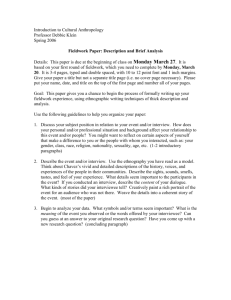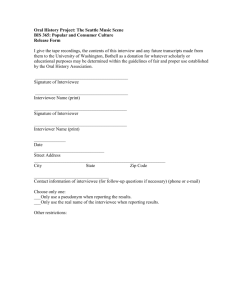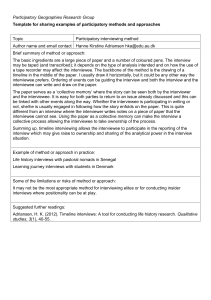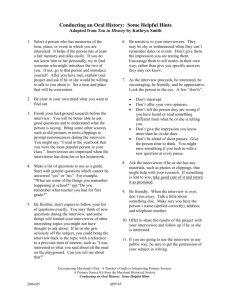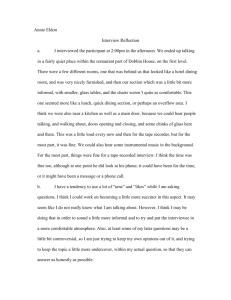LESSON PLAN – Interview Techniques
advertisement
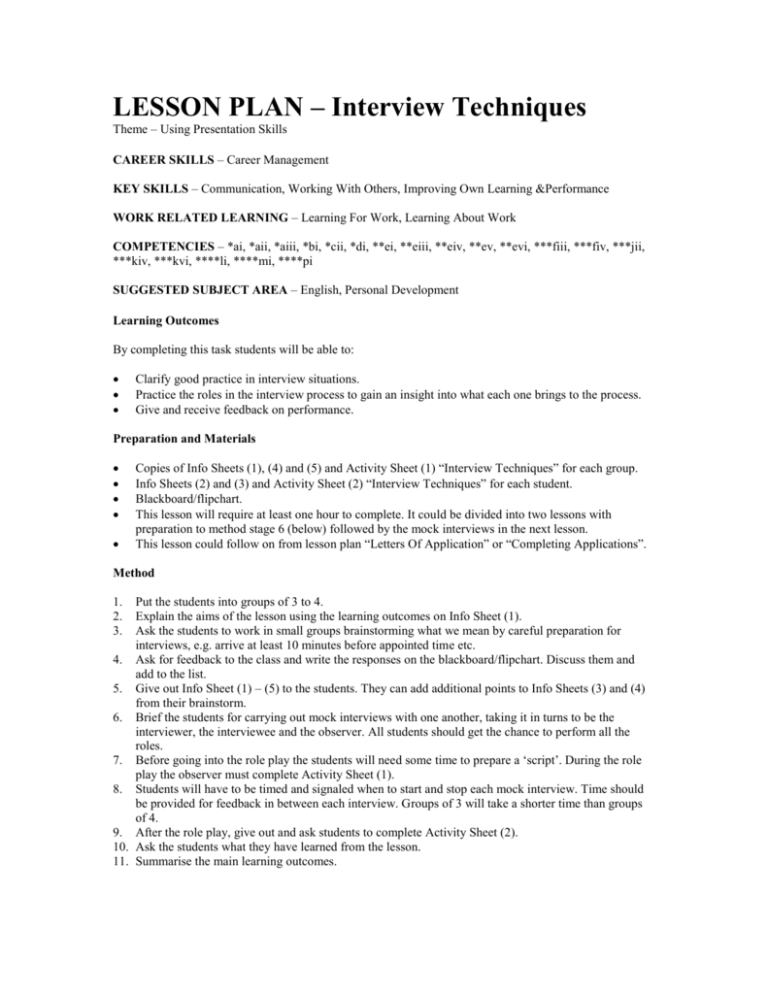
LESSON PLAN – Interview Techniques Theme – Using Presentation Skills CAREER SKILLS – Career Management KEY SKILLS – Communication, Working With Others, Improving Own Learning &Performance WORK RELATED LEARNING – Learning For Work, Learning About Work COMPETENCIES – *ai, *aii, *aiii, *bi, *cii, *di, **ei, **eiii, **eiv, **ev, **evi, ***fiii, ***fiv, ***jii, ***kiv, ***kvi, ****li, ****mi, ****pi SUGGESTED SUBJECT AREA – English, Personal Development Learning Outcomes By completing this task students will be able to: Clarify good practice in interview situations. Practice the roles in the interview process to gain an insight into what each one brings to the process. Give and receive feedback on performance. Preparation and Materials Copies of Info Sheets (1), (4) and (5) and Activity Sheet (1) “Interview Techniques” for each group. Info Sheets (2) and (3) and Activity Sheet (2) “Interview Techniques” for each student. Blackboard/flipchart. This lesson will require at least one hour to complete. It could be divided into two lessons with preparation to method stage 6 (below) followed by the mock interviews in the next lesson. This lesson could follow on from lesson plan “Letters Of Application” or “Completing Applications”. Method 1. 2. 3. Put the students into groups of 3 to 4. Explain the aims of the lesson using the learning outcomes on Info Sheet (1). Ask the students to work in small groups brainstorming what we mean by careful preparation for interviews, e.g. arrive at least 10 minutes before appointed time etc. 4. Ask for feedback to the class and write the responses on the blackboard/flipchart. Discuss them and add to the list. 5. Give out Info Sheet (1) – (5) to the students. They can add additional points to Info Sheets (3) and (4) from their brainstorm. 6. Brief the students for carrying out mock interviews with one another, taking it in turns to be the interviewer, the interviewee and the observer. All students should get the chance to perform all the roles. 7. Before going into the role play the students will need some time to prepare a ‘script’. During the role play the observer must complete Activity Sheet (1). 8. Students will have to be timed and signaled when to start and stop each mock interview. Time should be provided for feedback in between each interview. Groups of 3 will take a shorter time than groups of 4. 9. After the role play, give out and ask students to complete Activity Sheet (2). 10. Ask the students what they have learned from the lesson. 11. Summarise the main learning outcomes. Learning Outcomes: By completing this task you will be able to: Clarify good practice in interview situations. Practice the roles in the interview process to gain an insight into what each one brings to the process. Give and receive feedback on performance. INFO SHEET (1) – Interview Techniques “This could be the most important 20 minutes of your life” Interviews give you the chance to tell someone about yourself – your strengths, your achievements and your personal qualities This lesson provides an opportunity to do that. You will get the chance to be in the role of an interviewer and be able to observe someone else as well as being the interviewee Most people are nervous about selection interviews for jobs and courses. One way to reduce anxiety and perform better at interviews is to get some practice. This should help you to do better next time when it may really be “the most important 20 minutes of your life!!”. INFO SHEET (2) – Interview Techniques JOB SPECIFICATION The company requires an enthusiastic school leaver wanting to be part of the exciting world of the music industry. The person must be bale to work as part of a team, be a good communicator, be prepared to work flexible hours, be smart in appearance, have a keen interest in music and be committed to our training program. Qualification desirable but not essential. INTERVIEWER is Head of Personnel with the music company INFO SHEET (3) – Interview Techniques Interviewee’s Checklist PREPARATION Decide what to wear, be clean and tidy. Plan the journey including how long the journey will take. Find out about the company. Prepare some questions. Prepare some answers Take your Personal Education Plan and plan how you might use it. THE INTERVIEW Arrive 10 minutes early. Be friendly and cheerful to the secretary or receptionist who greets you. Look neat and clean. Be prepared to shake hands. Don’t sit until you are offered a chair. Try to relax and listen to the questions carefully. Look at the person asking the question. Think before you answer. Speak clearly and in a strong voice. Show interest and enthusiasm. Be honest. INFO SHEET (4) – Interview Techniques Interviewee’s Checklist continued QUESTIONS YOU MAY BE ASKED Tell me about yourself. Why do you want the job? What makes you think you would be good at the job? What do you do in your spare time? What qualities do you think you have to offer? How did you like school? What are your strengths and weaknesses? QUESTIONS WHICH YOU MAY ASK During the interview the details of the job will probably be explained to you, but there may be gaps and you may wish to ask your own questions. Wait until the end of the interview to ask questions and don’t ask too many. What are the normal hours of work? What training will I get? Are there any opportunities for promotion? Who will I be working with? Who will I be directly responsible TO? WHAT WILL THE EMPLOYER NEED TO KNOW? What qualifications you have to offer. What experience you have including work experience. The standard of your health. Whether you are keen, interested and willing to work. Whether you have the skills, abilities and personal qualities for the job. Whether you have found out about the company beforehand. INFO SHEET (5) – Interview Techniques Interviewer’s Checklist WHAT ARE THE CRITERIA THE INTERVIEWER WOULD USE IN THE SELECTION PROCESS? Qualifications. Work experience. Health. Home circumstances (e.g. distance from home to work). Skills/abilities. Personality. Interest and willingness to work. Knowledge of the company. Questions the candidate asks. WHAT WOULD YOU TELL THE INTERVIEWEE? What they would be expected to do, who they would be responsible to. Wages, hours, holidays, lunch arrangements. Training offered. Future prospects. Pension funds. Trade unions. ACTIVITY SHEET (1) – Interview Techniques Observers checklist Interviewee How is the interviewee sitting? What impression does this give? Is the interviewee prepared? Is the interviewee looking at the interviewer? Are the answers clear? What impression does the interviewee give? Confident, nervous Does the interviewee show interest and enthusiasm? Are the questions easy/difficult? Did the interviewee ask questions? Were they relevant? Other comments: Good points Bad points ACTIVITY SHEET (2) – Interview Techniques 1 Having taken part as an observer, interviewer and interviewee in today’s session, list the skills, personal qualities or previous experiences you have which would be of value to a potential employer. List any concerns you may have about your management of any interview situation. 2 3 4 Having watched or taken part in mock interviews, list the common weaknesses in an interviewee’s performance How could these be overcome? List 8 key factors important to an employer in interviewing a potential employee. 5 1. 2. 3. 4. 5. 6. 7. 8.
